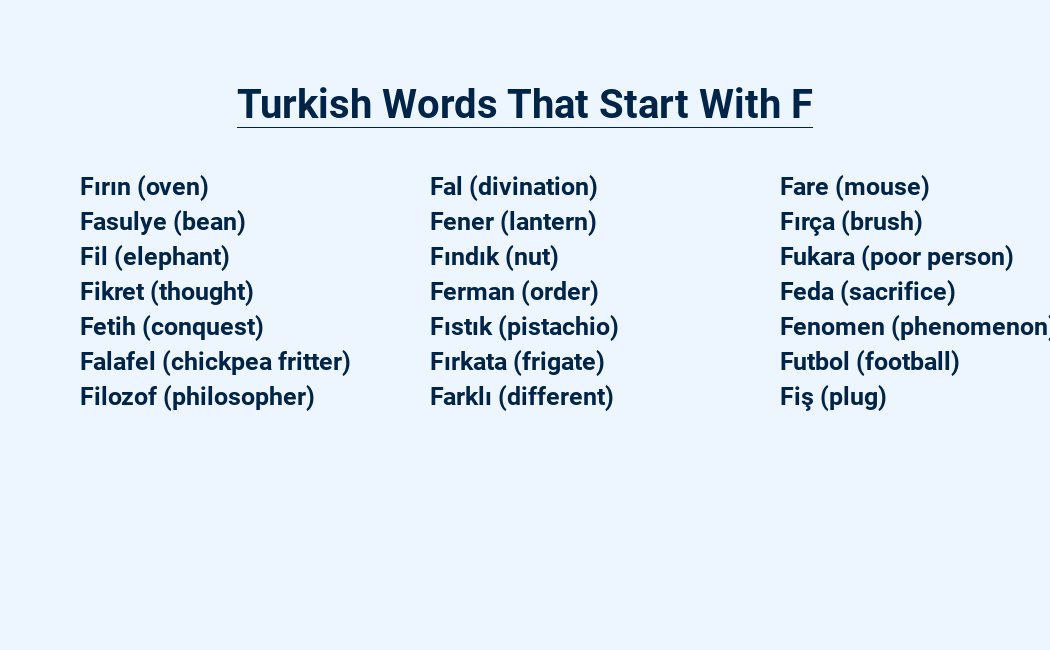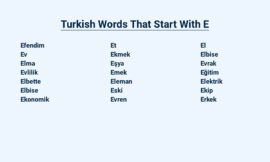Embark on a linguistic journey through the world of Turkish words that begin with the letter “f.” Discover essential vocabulary, from commonly used terms like “fakat” (but) and “fark” (difference) to more specialized words like “ferman” (edict) and “fiş” (receipt). Enhance your Turkish language skills and broaden your understanding of this rich and expressive language.
Fabrikasyon (factory-made): Refers to goods that are mass-produced in a factory setting.
Fakir (poor): Denotes a person or household with limited financial resources or income.
Fakülte (faculty): Used to describe a unit within a university that offers a specific field of study, such as the Faculty of Arts or the Faculty of Engineering.
Falcı (fortune teller): Someone who claims to predict the future or provide insights into a person’s destiny, often through methods like palm reading or tarot card readings.
Falcılık (fortune telling): The practice of attempting to predict the future or gain knowledge about hidden events or situations, often using mystical or supernatural means.
Falaka (flogging): A form of corporal punishment involving the beating of the soles of the feet with a stick or rod, historically used as a disciplinary measure.
Falçata (sickle): A curved blade attached to a long handle, commonly used for harvesting crops like wheat or barley, or for cutting grass in agriculture.
Fani (mortal): Describing the transient and perishable nature of human life, reminding individuals of their mortality.
Fanila (undershirt): A close-fitting undershirt worn under other clothing, typically made from cotton or synthetic materials.
Faraş (dustpan): A household item used for sweeping up dust, dirt, and small particles from floors or surfaces, often paired with a broom.
Fare (mouse): Refers to the common rodent found in many parts of the world, known for its small size, pointed nose, and slender tail.
Farfara (coltsfoot): A perennial plant with large, broad leaves and yellow flowers, traditionally used for its medicinal properties in treating respiratory ailments.
Fariga (fricassee): A French culinary term for a dish made by stewing meat, poultry, or fish in a sauce, typically thickened with flour or cornstarch.
Fasıl (chapter): Denotes a distinct section or division within a book, manuscript, or other written work, often focusing on a specific topic or theme.
Fasulye (bean): A general term for various types of beans, including kidney beans, pinto beans, black beans, and lima beans, which are commonly used in dishes and salads.
Fatih (conqueror): A historical figure or leader who has successfully conquered or acquired territory through military or political means.
Fatma (a female given name): A popular Turkish female name rooted in Arabic, often associated with qualities like beauty, kindness, and generosity.
Fatura (invoice): A commercial document that details the goods or services provided and their costs, typically issued by a seller or service provider to a customer.
Fazla (excess): Indicates an amount or quantity that exceeds what is considered normal, necessary, or appropriate in a given situation.
Fedai (devotee): Used to describe a person who is dedicated or devoted to a cause, ideal, or leader, often willing to make great sacrifices or take risks in pursuit of their goals.
Federe (confederation): Refers to a union or alliance of states, provinces, or groups that have joined together for mutual benefit or common action while maintaining their individual autonomy.
Fehim (understanding): Denotes the ability to comprehend, grasp, or perceive the meaning or significance of something, leading to a clear understanding of a concept or situation.
Fehmi (a male given name): A Turkish male name of Arabic origin, often associated with intelligence, wisdom, and understanding.
Fehimli (understanding): Describes a person who exhibits the quality of understanding, showing comprehension and empathy towards others.
Fehmi Bey (a male given name): A formal version of the name Fehmi, often used in a respectful or formal context.
Fehimler (a male given name): A plural form of the name Fehmi, sometimes used to refer to multiple individuals with the same name.
Fehim Beyler (a male given name): A plural form of Fehim Bey, typically used in a respectful or formal context when addressing a group of individuals named Fehmi Bey.
Felaket (catastrophe): Refers to a major disaster or misfortune that causes widespread damage or suffering, often resulting in loss of life or property.
Felek (heavens): Used to describe the realm of celestial bodies, the sky, or the universe, often in a poetic or metaphorical sense.
Fellah (peasant): A term historically used to refer to a peasant or farmer working the land, particularly in rural areas of the Middle East and North Africa.
Fellik fellik (diligently): An adverbial phrase emphasizing thoroughness, diligence, and persistence in searching for something or carrying out a task.
Felsefe (philosophy): Encompasses the study of fundamental questions related to reality, knowledge, existence, values, and ethics, seeking to understand the underlying principles of the universe and human experience.
Felsefeci (philosopher): A person engaged in the study of philosophy, exploring fundamental questions about existence, reality, and knowledge, and seeking to develop coherent and systematic answers.
Fen (science): Refers to the systematic study of the natural world and its phenomena, including physics, chemistry, biology, and other related fields.
Fenomen (phenomenon): Denotes an observable event, occurrence, or fact that is worthy of scientific study or investigation.
Fenomenoloji (phenomenology): A philosophical school of thought that emphasizes the study of phenomena as they are experienced and perceived by individuals, seeking to understand the structures and meanings of subjective experience.
Fenomenolojik (phenomenological): Pertaining to the philosophical approach of phenomenology, focusing on the study of subjective experiences and the structures of consciousness.
Fenti (wick): Refers to the combustible material in a candle or lamp that draws up fuel and allows it to burn, providing light.
Fer (ferry): A boat or vessel used to transport people or vehicles across a body of water, such as a river, lake, or strait.
Feragat (renunciation): The act of voluntarily giving up something, such as a right, claim, or possession, often for the benefit of others or to achieve a higher goal.
Ferahlatıcı (refreshing): Describes something that brings a sense of refreshment, invigoration, or rejuvenation, often used to describe beverages, scents, or experiences that provide relief from discomfort or dullness.
Feraset (discernment): Denotes the ability to make sound judgments and decisions based on intuition, experience, and perception, often used in the context of leadership and problem-solving.
Ferman (edict): An official order or decree issued by a ruler or authority figure, typically carrying the force of law and requiring obedience from subjects.
Fermuar (zipper): A fastening device consisting of interlocking teeth that can be opened and closed by pulling a slider, commonly used in clothing, bags, and other items.
Fersah (league): A unit of distance used historically, particularly in the Ottoman Empire, equal to approximately 3.5 miles or 5.6 kilometers.
Ferşat (opportunity): Refers to a favorable or advantageous situation or circumstance that allows for achieving a desired goal or taking advantage of a beneficial outcome.
Fertilite (fertility): Denotes the ability or capacity of an organism to produce offspring or the natural richness and productivity of soil.
Fesat (mischief): Used to describe actions or behaviors that cause trouble, harm, or disruption, often with malicious or disruptive intent.
Festival (festival): A special event or celebration that brings people together for cultural, religious, or recreational purposes, often featuring music, dance, food, and other activities.
Feşmekân (place): A general term for a location, area, or setting, often used to refer to a particular spot or venue.
Turkish words that start with f
Fakat (but)
Fakat, meaning “but” in Turkish, is a versatile word used to contrast ideas, indicate exceptions, or introduce unexpected information. It allows for smooth transitions between opposing thoughts, adding depth and clarity to sentences.
Fark (difference)
Fark (difference) is a Turkish word that means “distinction” or “variation.” It can be used to describe a contrast between two things, or a change in something over time.
The word fark is derived from the Persian word “farq,” which means “separation.”
Fayda (benefit)
Fayda, meaning benefit in Turkish, encompasses advantageous outcomes, positive impacts, and useful gains. It highlights the favorable consequences of actions, situations, or endeavors, emphasizing the value and utility derived from them.
Fena (bad)
Fena (bad) is a commonly used Turkish word to express something negative or undesirable. It can be used in various contexts, ranging from describing a situation to expressing disapproval or dislike.
Fena often conveys a sense of unpleasantness, harm, or undesirability.
Ferah (spacious)
Ferah means “spacious” in Turkish. It is often used to describe a room or building that feels airy and open.
The word can also be used to describe a person’s personality or demeanor, suggesting someone who is relaxed and easygoing.
Ferman (edict)
Ferman, also known as an edict, was an official decree or order issued by the Ottoman Empire. It served as a legal document carrying the authority of the sultan or other high-ranking officials and addressed various matters of governance, administration, and policy.
Fırsat (opportunity)
Fırsat, meaning “opportunity” in Turkish, holds the essence of seizing favorable chances.
It encapsulates the notion of recognizing and capitalizing on moments that can lead to positive outcomes, whether in personal or professional endeavors.
Fiskos (tax)
Fiskos (tax): A type of tax levied on certain goods and services in Turkey.
It is typically calculated as a percentage of the purchase price.
Fiskos is a significant source of revenue for the Turkish government and helps fund public services and infrastructure projects.
Fiş (receipt)
“Fiş” is a Turkish word that means “receipt.” It is a small piece of paper that is given to a customer after they have made a purchase.
The receipt typically includes information such as the date and time of the purchase, the items that were purchased, and the total amount paid.
Fitne (sedition)
Fitne, meaning “sedition” or “discord,” carries a negative connotation in Turkish culture.
It refers to actions or words that incite strife, division, or conflict among individuals or groups.
Fitne is strongly discouraged as it disrupts harmony and peaceful coexistence within society.
Final Verdict
The Turkish language boasts a rich and diverse vocabulary, with many words starting with the letter “f.” These words cover various concepts, including conjunctions, nouns, adjectives, and verbs.
From expressing differences (fark) to conveying opportunities (fırsat) and spaciousness (ferah), these terms play a vital role in shaping the nuances and expressiveness of Turkish communication.
Whether in everyday conversations or formal settings, these words add depth and clarity to the language, contributing to its overall richness and beauty.


